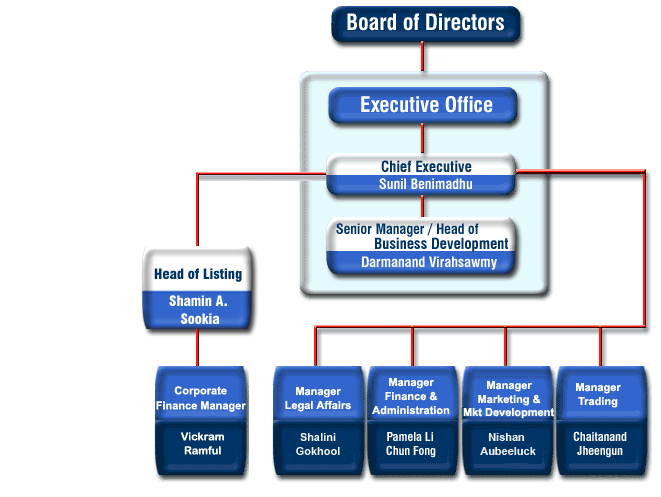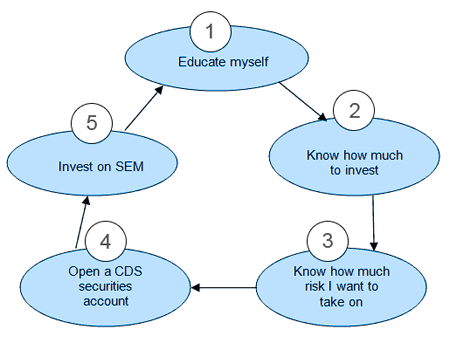The Stock Exchange of Mauritius
Post on: 16 Март, 2015 No Comment

An exchange-traded fund (or ETF) is an investment vehicle traded on a stock exchange, much like shares. Most ETFs are passively managed index funds which normally track an index, with their main objective being to participate in the economic growth of an industry, sector or commodity.
ETFs generally provide the attraction of the returns of a traditional tracker fund (like unit trusts) with the liquidity of a listed security. ETFs are traded at prevailing market prices, which are approximately the same price as the net asset value (NAV) of their underlying assets over the course of the trading day.
Individual investors should view ETFs as core, long-term investments.
Diversified investment — ETFs give investors a straightforward and inexpensive way to obtain a broad exposure to a given index, sector, country or commodity compared to the purchase of several individual company shares.
Tradability — ETFs provide investors with the ability to gain exposure to a broad market in one transaction as they trade on a stock exchange throughout the trading day. Investors buy and sell ETFs like shares, typically through an investment dealers account.
ETFs are bought and sold on a stock exchange throughout the day based upon market prices, which fluctuate according to supply and demand of the underlying asset/s.
Transparent — The ETF performance and portfolio composition are a reflection of the underlying index as the holdings of an ETF closely mirror the underlying index it tracks as a benchmark. This provides ETF investors with a greater degree of financial transparency.
Low Cost — Because ETFs are designed to closely track the performance of their respective benchmarks, they have less frequent portfolio changes than actively managed funds, making them less expensive to operate. Additionally, because subscriptions and redemptions occur in-specie, there are fewer internal costs associated with operating ETFs, resulting in the overall lower costs associated with ETFs.
Advantages of Exchange Traded Funds
- ETFs provide a diversified exposure through the purchase of a single ETF share.
- They offer a market related performance or return.
- Straightforward access to the performance of key indices and sectors.
- A cost effective way of trading a basket of securities through a single transaction.
- Automatic portfolio rebalancing of the constituent holdings of the respective index.
- The flexibility to buy and sell the ETF securities during SEM trading hours.
- A convenient method to invest and realise returns on investment.
- The convenience of calculating the value of the ETF investment at any time.
- Provide an opportunity for individuals and smaller institutions to track a market.
Drawback of Exchange Traded Funds
ETFs operate on the principle that in the medium to long term, tracking specific markets, indices or commodities offer better after-cost returns than traditional actively managed funds.
Risks associated with ETFs
- The value of an investment in an ETF may go up as well as down as the market changes.
- ETFs are not capital protected and therefore investors may not get back the amount invested.
ETFs also have other investment embedded risks like other instruments which include general market risks, interest rate risks, exchange rate risks, inflationary risks, liquidity risks and legal and regulatory risks.
- Market Risk: An ETF represents an investment in a portfolio of securities. Hence, the performance of the ETF will be directly affected by the performance of its constituent securities. In other words, an ETF tracking an index would be affected by the performance of the index.
- Currency Risk: You are exposed to currency risk if you hold an international ETF. The portfolio underlying an international ETF comprises assets, such as shares, listed on overseas markets. Those assets are priced in the currency of the overseas market.
As with any other security, investors buy and sell their ETFs through a securities exchange like the SEM. Profits (or losses) are made from the difference between the buying and selling price. Like any other security, ETFs do, however, carry the risk of losing rather than gaining money.
Individual investors should view ETFs as core, long-term investments designed to reduce the price fluctuations that generally characterise arbitrary buying and selling of securities
Trading of the ETFs on the Stock Exchange of Mauritius is done in accordance with the ATS Schedule of Procedures and Trading Rules.

The ETFs are traded in a similar manner as other instruments that are currently traded on the other boards of the SEM, with the following exceptions:
- The tick size for ETFs will be 0.01.
- Price spread shall not be applicable to trading in ETFs.
- ETFs will be traded in single unit and not in lot sizes of 100.
The matching principles are the same and are guided by the price/time priority attribute.
ETFs can be traded by both local and foreign investors.
Trades in ETFs are cleared and settled through the CDS in the same manner as trades in shares, on a T+3 basis. Investors must first open securities accounts in CDS through brokers or custodian banks. CDS sends statements of accounts to investors on a monthly basis. Investors may also view their account activity online via the Internet.
Dividend Payment
When there is a dividend payment, the Issuer provides the relevant information (dividend amount, cum-date, ex-date etc.) to SEM and CDS. The last cum-date is three business days before the record date.
On the record date, CDS makes available to the Transfer Agent an Entitlement Schedule (text file) which contains all the relevant details of the ETF unit holders, including name, address and disposal instruction.
The Transfer Agent then uses the Entitlement Schedule to make dividend payment of directly to the unit holders. If the Transfer Agent is not a local one, it will have to make the necessary arrangements with the bank where it will open its account.
Redemption or Transfer of Units to Other Markets
When units have to be redeemed or transferred to other markets, the Transfer Agent will submit written instructions for the direct debiting of the securities accounts of the holders of the ETF and will provide CDS with an Allotment Schedule. The Allotment Schedule will contain the security code allocated to the particular issue of ETF, the securities account numbers to be debited and the respective number of units of ETF to be debited.
The Issuer of ETFs has an obligation to ensure liquidity by making a market in the ETF once it is listed. This unique obligation explains the success of ETFs globally as these securities are more liquid than traditional listed investment funds.
To meet this market making obligation, the Issuer has to appoint a Market Maker or liquidity provider as they are classified in other jurisdictions, who effectively become the provider of liquidity on the ETF securities. The Market Maker therefore, becomes a key participant in formulating fair prices in the market. This ensures that variances between the market price of the ETF security and the net asset value (NAV) of the fund are eliminated. As an example, if an ETF security is traded at a price higher than the NAV price (premium), the Market Maker will buy the underlying assets at the price which corresponds to the NAV of the ETF and then, will exchange these assets for the new overvalued ETFs (via the creation of new securities). On the contrary, if an ETF is traded at a price that is lower than the NAV (discount), then the Market Maker will buy the undervalued ETF securities and will exchange them with the corresponding underlying assets (via redemption).














